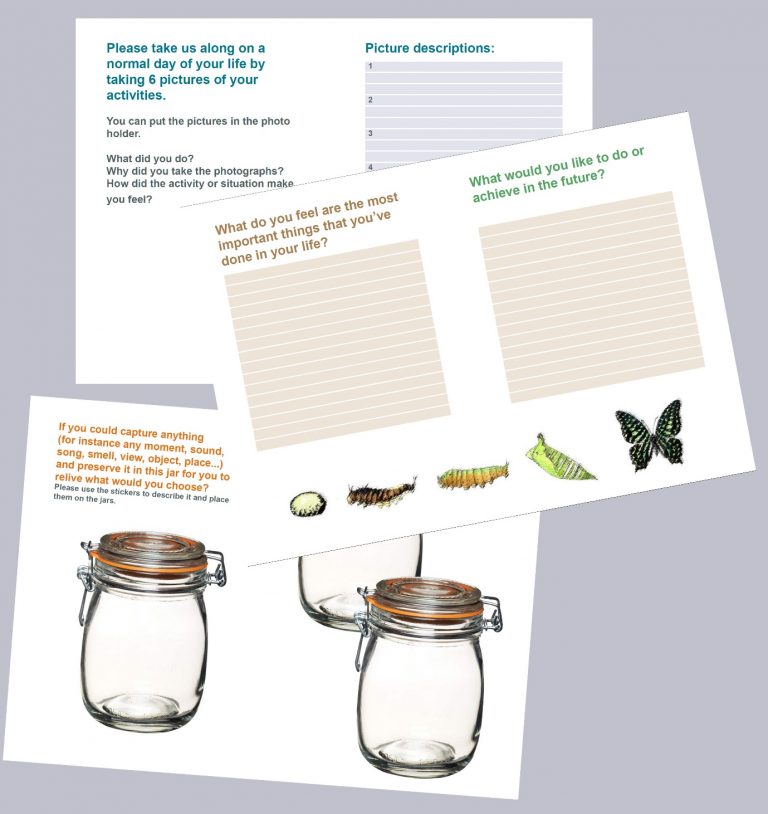
The “visual diary” or “probe” was developed to obtain richer contextual information about the life of people with dementia and to complement the interviews in the data collection phase (WP3). Probes are open assignments that engage participants in the self-documentation of their personal life context.
Traditional qualitative research approaches such as interviews and focus groups are highly researcher-steered and participants mainly react to questions. Therefore, they do not always adequately reflect participants’ concerns (Brown et al., 2014). Design probes allow participants to act on open tasks or questions and determine their own focus in their answers. Probe assignments focus on participants’ daily lives. They look at the user’s personal context and employ the user’s own perspective to enrich design. By including social, aesthetic and cultural environment, needs, feelings, values and attitudes, they can provide deeper insights into people’s experiences, concerns and values (Mattelmäki, 2006). As a supplement to the interviews, the activity book allowed for more active participation and could be worked on at the times the participants wanted to.
The activity books were based on a framework to collect information on two general topic; (1) personal information about e.g. goals, attitudes, experiences, motivation, capabilities, and social context, that could be used to develop rich personas, and (2) information about areas of change and needs for preservation in peoples life with respect to ADL, leisure activities, social engagement and wellbeing. The design of the activity books consisted of a folder and large loose leaves that could be worked on separately in the order of choice. To cater for personal preferences of participants and to generate additional visual information about their life context in addition to the verbal information from the interviews, the activities of the books allow for various ways of expression such as writing, drawing, photographing and crafting. Furthermore, to make the probes accessible for every one of the participants, the activities were of varying difficulty, did not require learning and were designed to be gender neutral. A few of the probes were based on the artful work of Wallace, Wright, et al. who used probes to get insight into personhood in dementia (2013).
9 activity books were distributed over three countries, Germany, the Netherlands and Spain. They remained the property of the participants but anonymized pictures were taken of the results.
The results have provided valuable insights into decision making and attitudes with respect to future plans of people with dementia. Further details are available here:
Garde, J.A., Voort, M.C.v.d., Niedderer, K. (2018). Design Probes for people with dementia. Proceedings of DRS 2018 International Conference: Catalyst, 6, pp. 2607-2621. Open Access Proceedings.
Visual diaries (German version) – Download
Visual diaries (Dutch version) – Download
Visual Diaries (Spanish Version) – Download
Visual diaries (English version) – Download
Please feel free to use the visual diaries. If you do so, please give due acknowledgement to the authors, which are listed at the back of the diaries. It would also be great to hear from you with some feedback via our contact page.
References
Brown, M., Tsai, A., Baurley, S., Koppe, T., Lawson, G., Martin, J. L., . . . Arunachalam, U. (2014). Using Cultural Probes to Inform the Design of Assistive Technologies. Paper presented at the Human-Computer Interaction.
Mattelmäki, T. (2006). Design Probes. Helsinki: Publication Series of the University of Art and Design Helsinki A 69.
Wallace, J., Wright, P. C., McCarthy, J., Green, D. P., Thomas, J., & Olivier, P. (2013). A Design-led Inquiry into Personhood in Dementia. Paper presented at the CHI, Paris, France.
